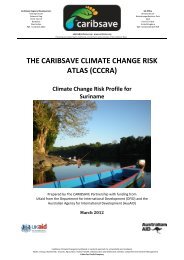You also want an ePaper? Increase the reach of your titles
YUMPU automatically turns print PDFs into web optimized ePapers that Google loves.
power outages <strong>and</strong> blocked road access for a short period, but the utilities <strong>and</strong> other major infrastructure<br />
remained intact. Residents reverted to using traditional methods for food preparation (e.g. coal stoves)<br />
after the hurricane when no electricity or gas was available. Comparing the impacts on Providenciales to<br />
those on neighbouring isl<strong>and</strong>s, there were very different experiences in Gr<strong>and</strong> Turk <strong>and</strong> South <strong>Caicos</strong>,<br />
where many houses suffered extreme damage, but to a lesser degree in the latter. North <strong>Caicos</strong> however,<br />
much like Providenciales, suffered relatively little physical impact.<br />
It is the norm that with the expected passage of a hurricane, all tourism centres are closed, <strong>and</strong> tourists are<br />
usually evacuated from the isl<strong>and</strong>. If accommodation facilities are damaged, they may remain closed until<br />
repairs have been completed. Undamaged properties may still suffer from a lack of power or water for<br />
some time, <strong>and</strong> as a result, may remain closed. Employees may be out of work temporarily until normal<br />
functions resume. In the two weeks after Hurricane Ike, an estimated 80% of the hotels on Providenciales<br />
remained closed. This resulted in losses of approximately $2,000,000 in revenue (ECLAC, 2008).<br />
Most of the hotels in Gr<strong>and</strong> Turk, in particular, experienced extensive roof damage or complete loss of<br />
roofs which resulted in damage to equipment <strong>and</strong> furnishings. In addition, Hurricane Ike was particularly<br />
harmful to trees <strong>and</strong> other forms of vegetation. Based on the level of damage experienced by the hotels, a<br />
majority of proprietors anticipated being out of business for between 8-12 weeks. In some cases though,<br />
hotels began operating on reduced capacity (ECLAC, 2008).<br />
Most large employers would continue to pay their staff despite the temporary closure, so financially; these<br />
persons are less adversely affected. However, smaller operators <strong>and</strong> self-employed persons (e.g. vendors)<br />
lose income each day that they are unable to work, whether due to their own circumstances (e.g. damaged<br />
assets), lack of access or utilities, or lack of customers. The latter can especially undermine any incomemaking<br />
efforts, in cases where the majority of the clientele are tourists, <strong>and</strong> tourist flows can shrink<br />
considerably for an extended period of time following a hurricane.<br />
After the experiences with Ike <strong>and</strong> Hanna, there is a greater awareness of how to prepare for tropical<br />
storms <strong>and</strong> hurricanes. The building code was adjusted <strong>and</strong> further enforced after these events to ensure<br />
that new buildings were capable of withst<strong>and</strong>ing hurricane force winds <strong>and</strong> impacts, <strong>and</strong> by large measure<br />
to reduce the vulnerability (<strong>and</strong> losses) to individuals <strong>and</strong> businesses.<br />
With regards to flooding impacts, Lower Bight experienced some flooding in November of 2008 <strong>and</strong> in<br />
summer of 2005 (two events in 2005). The community sits on a hill above the coast, but the coastal road<br />
(Lower Bight Road) is the main access road, which can be cut off during a flood. Experiences vary <strong>and</strong><br />
depend on one’s respective location within the community. Some residents suggest that floodwaters tend<br />
to recede quickly, whereas other residents, especially in developed or cemented areas; report that water<br />
tends to pond (e.g. on the road). Flooding may result in minor damage to persons living in the community,<br />
but presents more of an issue for access <strong>and</strong> transportation, as residents may not be able to commute as<br />
desired until waters have receded.<br />
Storm surge impacts vary depending on the intensity of the passing weather system. Light to moderate<br />
storm surge events will cause major beach erosion <strong>and</strong> affect hotel properties <strong>and</strong> facilities that are<br />
situated on the beach. However, more extreme storm surge events can cause coastal inundation <strong>and</strong> more<br />
extensive damage to coastal infrastructure. Small craft (yachts, diveboats, fishing boats) docking along the<br />
coast (e.g. in Turtle Cove Marina, though not in Lower Bight proper) are extremely vulnerable to storm<br />
surge impacts, <strong>and</strong> can be severely damaged during hurricanes despite heavy anchoring.<br />
Another important sector of employment for Lower Bight residents is construction. This sector consists<br />
mainly of men, working as self employed masons <strong>and</strong> carpenters, or employed with a larger construction<br />
102





